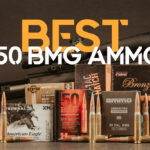
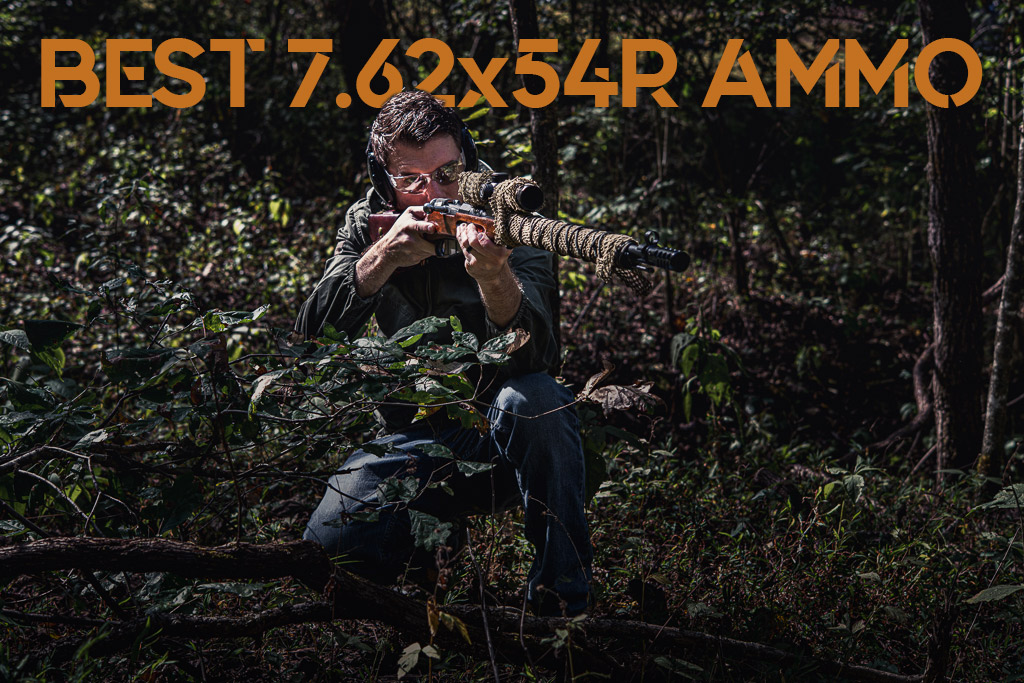
By Guy J. Sagi
Mosin-Nagants are often homely, always loud and not generally known to be precision rifles. However, if you go to a gun show, you’ll notice a line at the dealer tables to purchase these historical long guns. So why are these surplus rifles so desirable? For starters, they are budget-friendly. Plus, Mosin Nagant ammo is easy to find in bulk surplus and the rifles are arguably history’s most deadly sniper weapon.
Historical Context: Myth VS Legend
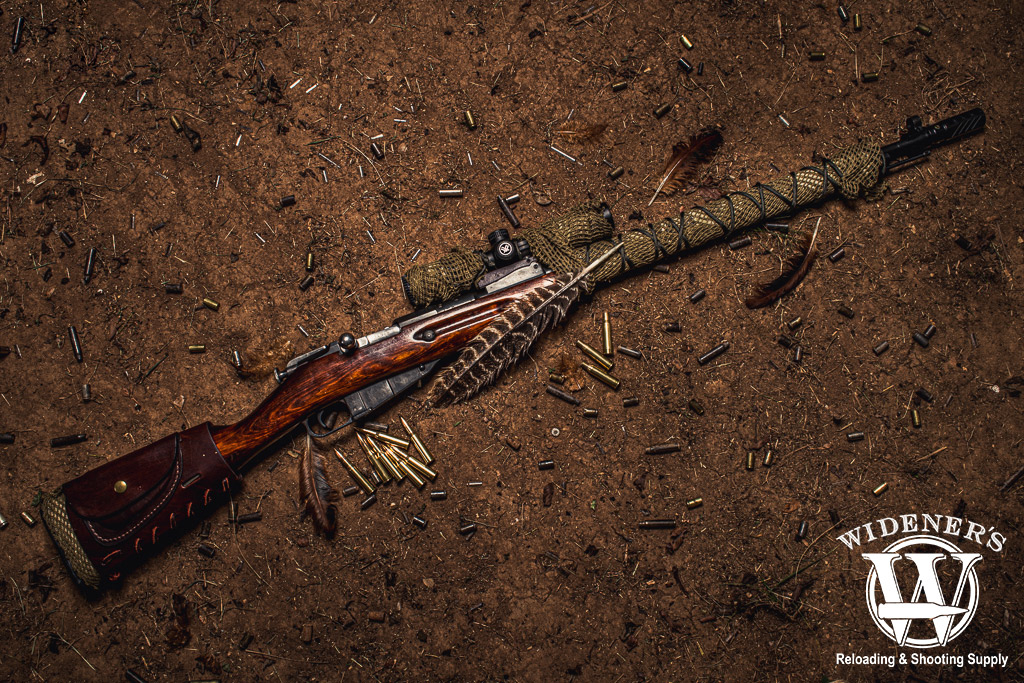
There are many myths & legends surrounding the Mosin Nagant rifle, thanks in part to Soviet-era propaganda.
Russian soldier Ivan Sidorenko used one to reportedly take out more than 500 Nazis during World War II. Finish sniper Simo Häyhä—or Haya, depending on translation—claimed the lives of even more Russians during the Winter War of 1939 and 1940 when communists invaded his country. Roughly half of his tally, which some estimate to be in excess of 700, came behind the trigger of an iron-sighted Sako-made version of the rifle.
That’s only two in a very long list of marksmen who used a Mosin-Nagant in defense of their nations. There were several ‘markswomen’ too, including Lyudmila Pavlichenko who started her sniper career with a model 1891 Mosin and a 4X PE sight. If legends and myths are largely made of truths, the tales of the Mosin have placed it on the Hollywood radar. The rifle played a starring role in the movie “Enemy at the Gates,” on Jude Law’s shoulder, although it didn’t earn an Academy Award nomination for the performance.
There’s no denying the definition of a confirmed long-distance connection was vastly different back then. At the time, consistent one- and two-mile shots were the stuff of Jules Verne’s science fiction. Scientists understood Coriolis effect, but at small-arms distance bullets didn’t stay in flight long enough for the planet to rotate earthbound targets harmlessly away.
Still, neutralizing an enemy target, and doing it reliably in inhospitable combat conditions is where the Mosin-Nagant shined. U.S. enthusiasts have taken note and own tens of thousands of the surplus rifle, for good reason.
7.62x54R Ammo Quick Answer Box:
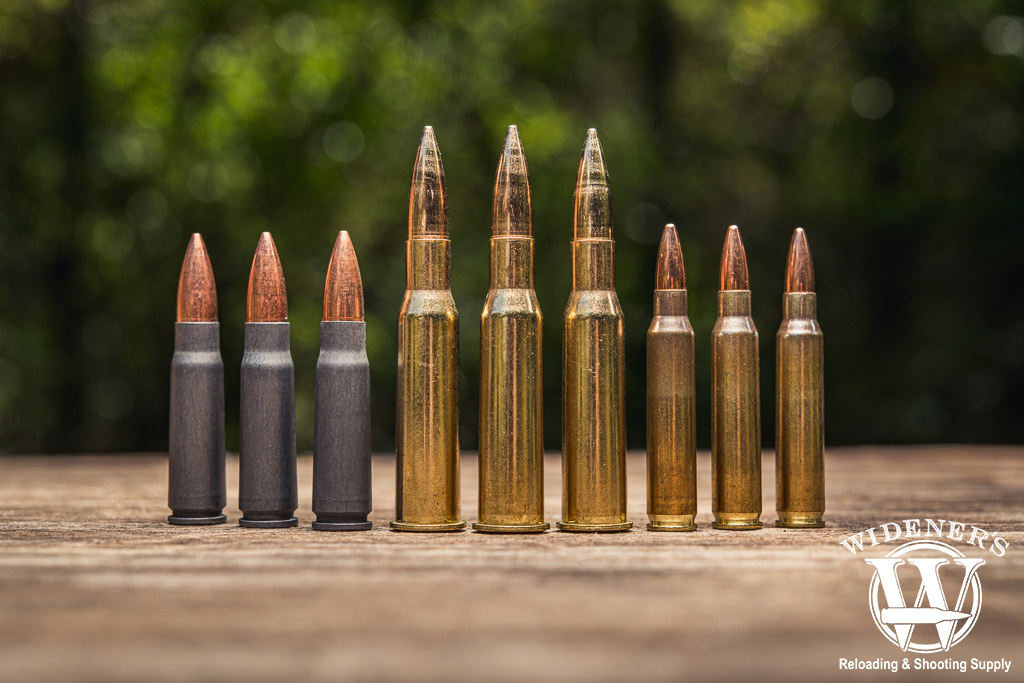
From left to right: The 7.62×39, 7.62x54R, and 5.56×45 cartridges compared.
Q: Which guns use 7.62x54r ammo?
A: Many rifles use the 7.62x54r cartridge. The following are all chambered in or have variations chambered in the famous rimmed cartridge: Mosin Nagant Rifle, Dragunov/SVU Sniper Rifle, PSL Sniper Rifle, SV-98 Sniper Rifle, SVT-38/SVT-40 Rifle, Vepr Sporting Rifle, DS-39 Machine Gun, Madsen Machine Gun, PK/PKM Machine Gun, Zastava M84 Machine Gun.
Q: Is 7.62x54r ammo good for hunting?
A: Yes, the 7.62x54r cartridge is excellent for hunting medium-sized game such as deer, elk, and bear. It has a relatively flat trajectory, heavy grain bullets have little drift, and it’s generally accurate out to 300 yards, depending on your rifle and ammunition choice. It has comparable ballistic performance to standard 7.62 rounds, falling somewhere in between the .30-06 and .308 (7.62×51 Nato) cartridges.
Q: Is 7.62x54r ammo corrosive?
A: Surplus 7.62x54r ammo is corrosive. To be clear, it’s the Berdan primer seated in the bottom of the casing that is corrosive, not the bullet, powder or the casing. If you plan on shooting corrosive surplus ammo, be sure to clean your gun immediately after. New, commercially produced 7.62x54r ammo is non-corrosive, it’s usually labeled on the front or side-flap of the box.
Mosin-Nagant Development
Russia was victorious in the Russo-Ottoman War of 1977-1878, but the conflict made it obvious its troops deserved a better rifle. A committee convened in 1889 with the task of selecting a proper replacement, something more modern than the single-shot Berdans its military fielded.
After two years the group was still in deadlock. Without a clear choice from the three submissions, it reorganized, created written requirements for the firearm and asked designers to come back with rifles tailored to those specific needs.
They did and a rifle created by Russian Captain Sergei Ivanovich Mosin finally won the competition. The bolt-action had a five-round, non-detachable magazine and bottom metal that hinged open to insert fresh cartridges. The receiver also accepted stripper clips for faster reloads.
Unfortunately, it had a habit of trying to double-feed the 7.62x54r cartridges it digested. That kind of stoppage isn’t acceptable for a military arm, so the committee borrowed a component from Belgium designer Léon Nagant’s .35-caliber submission—an interrupter on the extractor. It solved the problem and cemented the Mosin-Nagant name in firearm history.
Accompanying Cartridge: 7.62x54R

The rimmed casing of the 7.62x54r cartridge is a visual calling card back to its introduction in 1891.
When the Mosin-Nagant—designated the M1891 at the time—appeared, it brought with it a new cartridge. The 7.62x54r (r for rimmed) is more than 120 years old, but it still serves in a variety of military rifles, including Dragunov sniper rifles.
Despite its 7.62 label, bullet diameter is 7.92 millimeters, which converts to .312 inch. The designation isn’t the only thing unusual about the round. The bottlenecked cartridge is one of the few rimmed versions with that profile still widely used today.
Rimmed Ammo Quality
The Mosin-Nagant’s history speaks volumes for the design’s potential in the right hands, but this is a utilitarian Russian rifle, first and foremost. Early stocks began life as walnut blanks, but other, more readily available wood appeared throughout the years. Most show the stark reality of military efficiency—functional and decent—although some battered versions have all the aesthetic appeal of Chernobyl.
Receiver, barrel and bolt are nothing fancy. Find a gunsmith to tap the receiver if you want to mount a scope, otherwise, live with the iron sights. The action is rarely as smooth as contemporary Enfields and Mausers, but the Mosin-Nagants thrived in the snow, muck and mud of Stalingrad and Moscow during World War II. Good luck stopping one up stateside.
Triggers vary. The safety is a knob on the back of the bolt and is not easy to work—pull back and twist, if you can. Most owners simply leave the chamber empty instead of engaging in the wrestling match at the firing line.
As for accuracy, it varies by the rifle’s prior abuse. Many have been sporterized in most unpleasant ways, like backyard gunsmiths who decided shortening the barrel requires nothing more than a hacksaw. Others readily print 2 or 3 moa groups that shrink with the right ammo and practice.
The stock can pound tank tracks back into place without splintering and probably did at Leningrad. Russian Tank Manuals don’t endorse the fix, but there’s never a doubt that Mosin-Nagants can take a beating.
Best Mosin Nagant Ammo
The 7.62x54r is the original cartridge and the one chambered by most Mosin-Nagants today. Rarer variants include 7.62x53r (Finnish), 8x57mm Mauser and 8x50r Mannlicher.
All 7.62x54r ammunition is Berdan primed and historically corrosive. It still is in some of the military surplus ammunition available today, although the cost savings these loads offer make it an affordable centerfire option for centerfire plinking sessions.
Best Mosin Nagant Ammo For Plinking
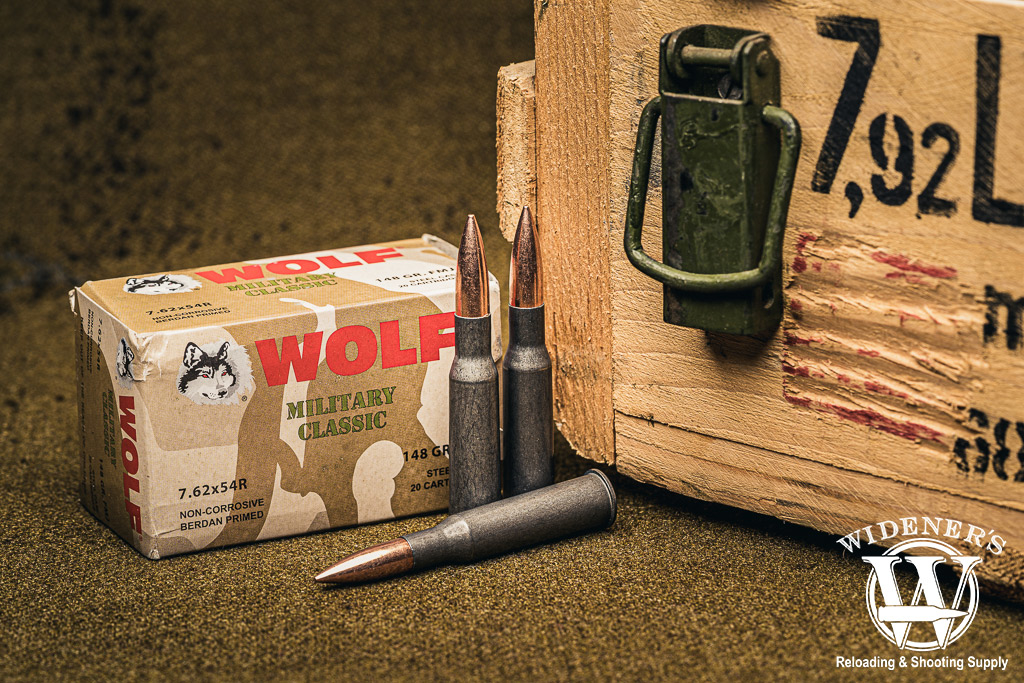
A great budget plinking round, load up and take the 148gr FMJ Wolf to the range on your next trip.
The Russian Military Surplus 7.62x54r spam can of 440 rounds is a good example. The copper-washed, steel-cased cartridges feature a 148-grain FMJ bullet ideal for punching paper or bunker storage until it’s SHTF time. If you’re worried about damage to that collectible, simply follow the lead of some of the world’s most famous snipers and religiously scrub after every range session. It’ll last for decades with the proper maintenance and keep tracked vehicles on the move.
Wolf makes an excellent bang-for-the-buck plinking round in their 148gr FMJ Military Classic label. This lightweight round is manufactured in a steel case, is non-corrosive and Berdan primed. Worried about shooting steel-cased ammo in your Mosin? Don’t be. As the Soviets would say, “NYET! Rifle is fine!”
Best Mosin Nagant Ammo For Target Shooting

Precision accuracy from a rimmed cartridge? The Prvi 182gr FMJ BT bullet is consistent and reliable with marksman level accuracy.
For those too busy to add more cleaning to their to-do list, there’s no shortage of modern flavors. There’s a variety of bullet weights and styles in non-corrosive, freshly minted loads. If precision is your game, consider the Prvi Partizan 182-grain FMJ and 182-grain FMJ-BT loads.
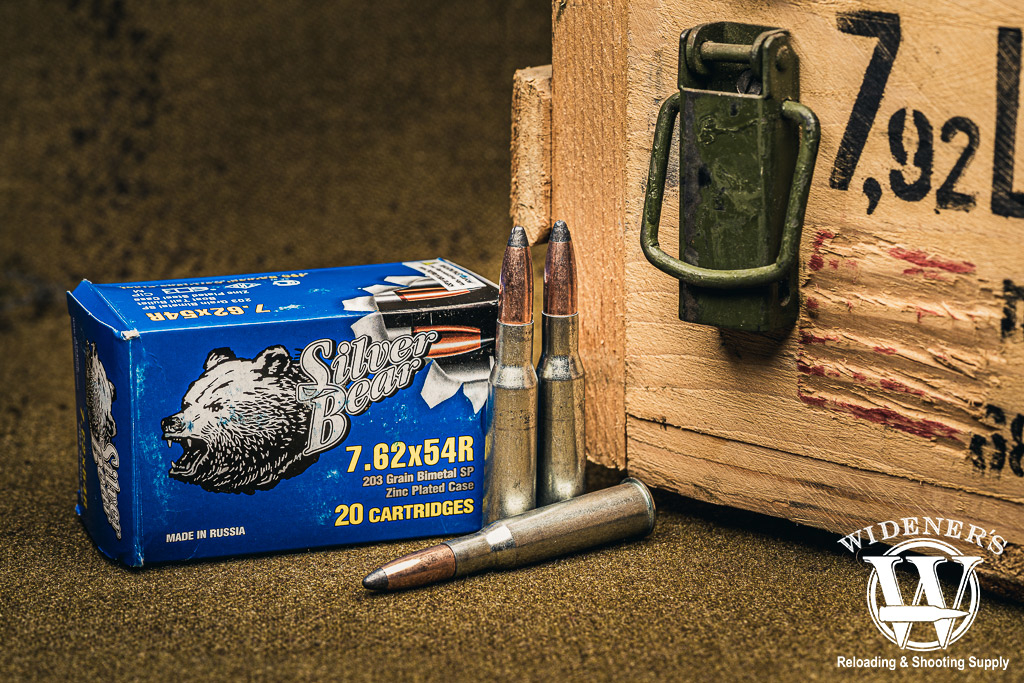
Silver Bear: It’s big, it’s heavy, it punches holes in targets and game with good accuracy from long distances.
Bullet weights are often a critical ingredient when dialing into a rifle’s accuracy and 7.62x55r comes in a variety of FMJ options. On the heavy end, still plenty clean, Brown Bear’s 174-grain could be big medicine when shrinking groups. For low-drift performance in long-distance target practice, try the heavy grain, steel-cased 203gr Silver Bear SP round.
Best Mosin Nagant Ammo For Hunting
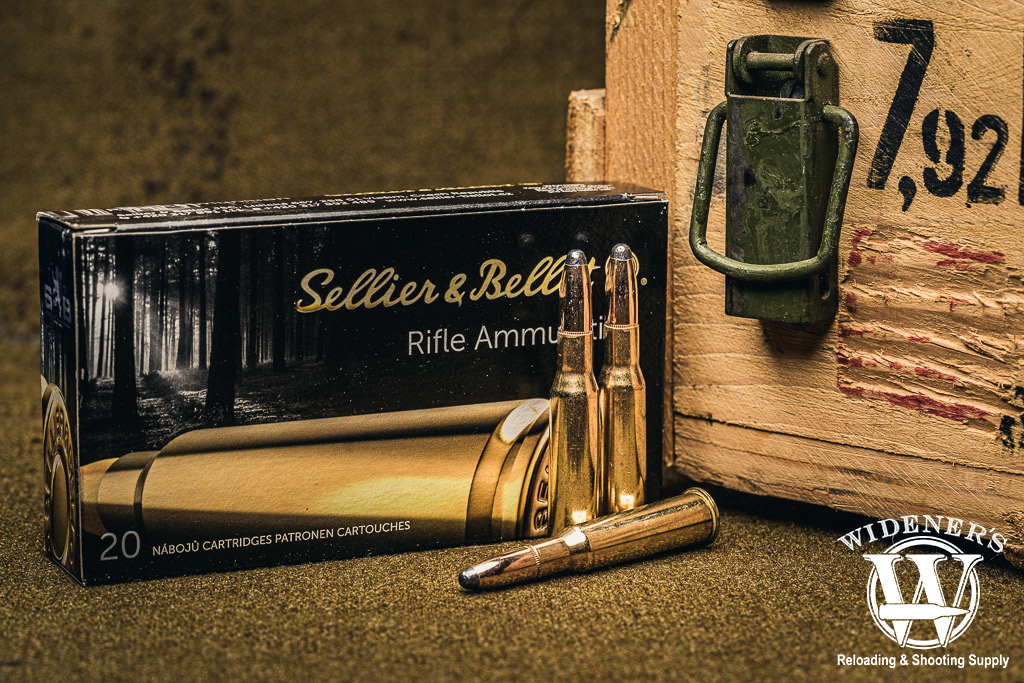
On the hunt? Bring back your trophy buck with Sellier & Bellot 180gr SP 7.62x54r ammo.
If hunting is on the schedule, there are also 150- and 203-grain soft point loads to fill that big game tag. Sellier & Bellot make a mighty 180gr SP round, that thumps medium-size game targets well from a distance. Again, the cartridges are non-corrosive.
Nostalgic, Effective & Relevant
The Mosin-Nagant and 7.62x54r may be long in the tooth, but history proves they both are effective and reliable in unimaginable conditions. History has not changed, neither has the rifle. Although the selection of cartridges from which to choose—including a long list of clean-burning non-corrosive options— has improved dramatically.
There’s never been a better time to pull your Mosin out of the safe and head outdoors. If you are in the market, take a closer look at that slightly battered surplus rifle you’ve been ignoring at your favorite gun store. It may take a little elbow grease to get the cosmoline off, but you’ll be glad you did.


